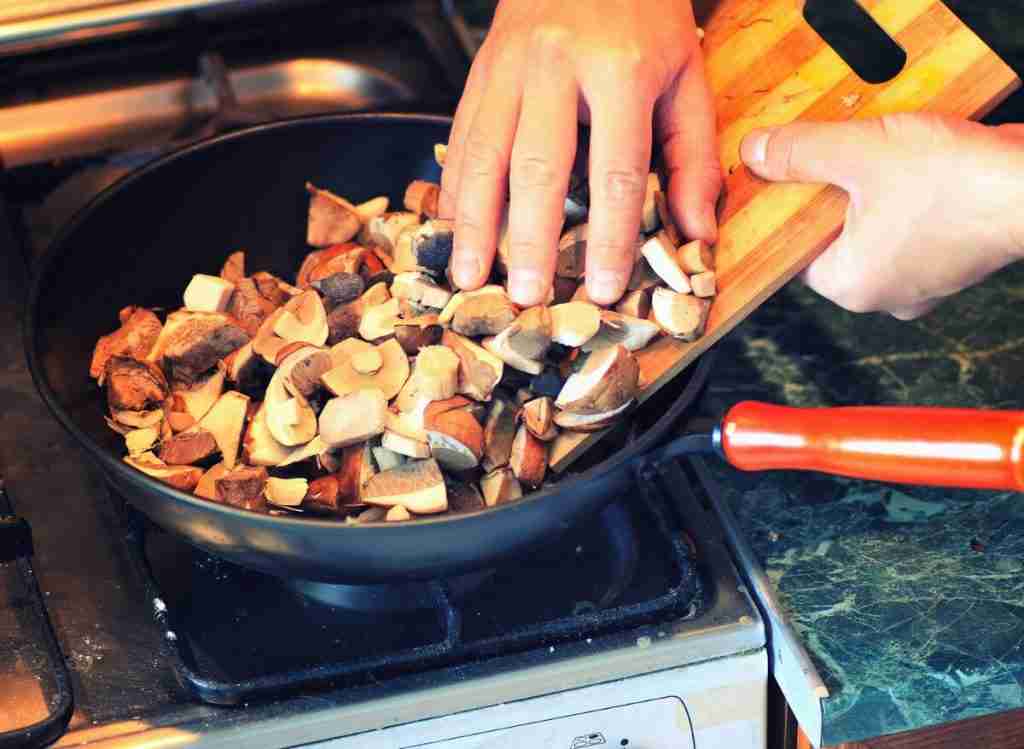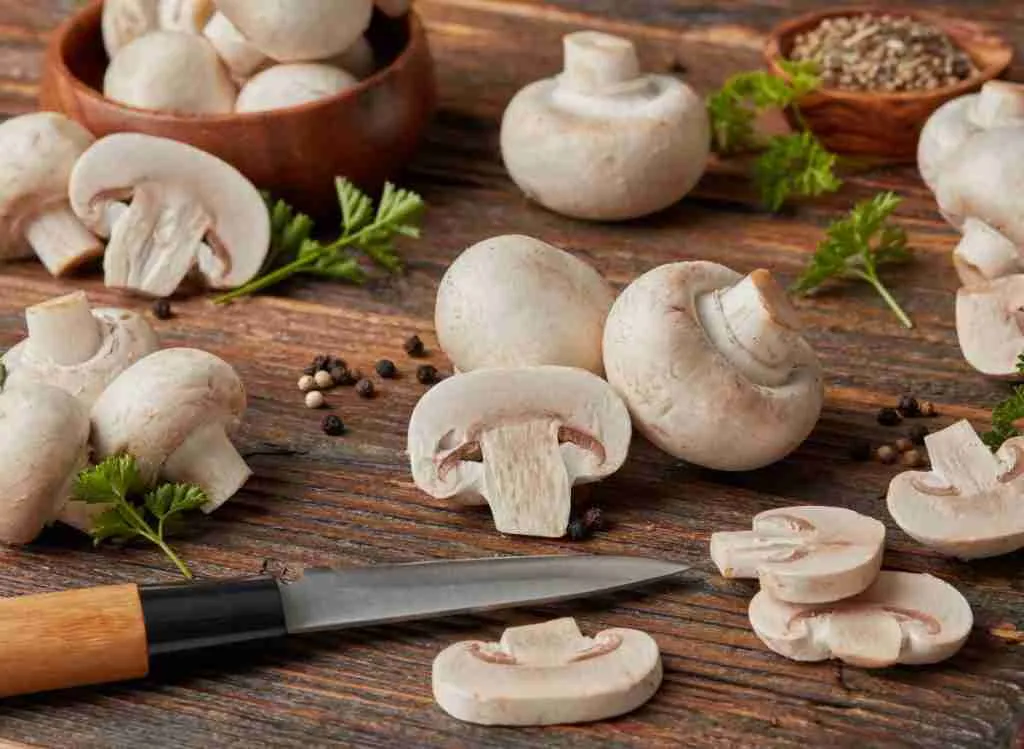Mushrooms are great light foods that are rich in essential nutrients. One can use them as a healthy, light food that doesn’t result in any weight gain or other health issues. However, these may get moldy sometimes. In such situations, it’s risky to eat them. So, if one mushroom has mold, can you eat the rest?
Some foods, including mushrooms (fungi are technically mold), are supposed to be moldy; therefore, it is safe to get rid of the moldy part and eat the good part, according to Cleveland Clinic. In addition, ensure you disinfect the kitchen parts that came in contact with the mold. Always remember that when you are in doubt, throw it out.
You can safely eat the rest of the mushrooms by removing them a few centimeters away from the infected area. This is a safe and healthy way to consume moldy mushrooms. If you’ve one affected piece in a pile, you can use the rest after proper cleaning. But make sure that you’ve cleaned them properly.
Read on to find out all preventive measures to handle moldy mushrooms. You might also enjoy reading: Which Mushrooms Contain The Most Protein? (Let’s find out now!)

Table of Contents
What Are Molds?
Molds are tiny fungi living on animal or plant matter. Unlike one-celled bacteria, molds are made of multiple cells and can sometimes be seen with the naked eye. When observed under a microscope, molds look like skinny mushrooms. Generally, mold’s body consists of ·
- A stalk growing above the food
- Spores that typically develop at the ends of the stalks and give mold the color you see
- Root threads that infest the food it lives on
Some molds may cause allergic reactions and respiratory issues. A few molds produce “mycotoxins,” poisonous substances that can make you sick in the right conditions, according to the United States Department of Agriculture (USDA).
What Causes Molds On Mushrooms?
Different reasons may cause mold on mushrooms that make them harmful. Here are some reasons that cause this issue.
- If mushrooms are exposed to moisture, this may result in mold.
- If you expose mushrooms to the heat, it may also damage them.
- Proper watering is essential for their proper growth. If one provides them with plenty of water, it can result in mold too.
- Mushrooms that are stored for a long time may get mold.
Do Molds Cause Mushroom Poisoning?
Molds don’t cause mushroom poisoning, according to the United States Department of Agriculture (USDA). However, consuming raw or cooked mushrooms can cause mushroom poisoning because the toxins that cause mushroom poisoning are produced naturally by the fungi.
To prevent mushroom poisoning, avoid eating poisonous mushrooms.
See also: 12 Pros And Cons of Consuming Portobello Mushroom.
How to Prevent Molding of Mushrooms?
Molding mushrooms may affect health; therefore, ensure you take the appropriate precautions. Here are different methods to avoid the molding of mushrooms.
1- Keep your fridge neat and clean
The United States Department of Agriculture (USDA) suggests cleaning the inside of your fridge every few months To minimize mold growth:
- Wash and clean the inside of your fridge every few months with one tablespoon of baking soda dissolved in a quart of water.
- Rinse with clear water and dry.
- Scrub visible mold (generally black) on rubber casings using three teaspoons of bleach in a quart of water.
- Keep your towels, dishcloths, sponges, and mops clean and fresh. And throw every item that you can’t launder or manually clean.
2- Prevent Them From Warmness
Different reasons may lead to the molding of mushrooms. Out of them, heat is one of the major reasons. If you’re facing this issue, check whether you’re storing them in a warm place. If yes, avoid storing them at such a place. So, make sure that the place where you store them features ventilation.
- The ideal temperature to store them is about 16° to 20°. Ensure you keep the humidity level in your house below 40%.
- Hot and humid temperatures are an ideal breeding ground for mold, so don’t leave food out on your kitchen counter for too long. Ensure you cover refrigerated food with a lid, plastic wrap, or foil because mold spreads by airborne spores.
3- Store Away From Soil and Plants
If you put the mushroom kit near the soil or plant, it may result in mold. Indoor plants can also cause this issue, so avoid storing them away from plants and soil.
4- Use a Clean Knife
Cleanliness is vital in preventing mold. If you’re facing mold issues with mushrooms, check out whether the cutter or knife is clean or not.
If you’re using a knife that is not properly cleaned, it may cause molding. So, clean it with alcohol or hot soapy water and then with clean water.
5- Clean Your Hands Before Handling Mushrooms
Washing your hands can help you avoid cross-contamination and prevent the spread of food poisoning.
Mushrooms can get moldy if you touch them with dusty hands. Also, your hands can be home to many microbes and other harmful particles. So, make sure that you’ve cleaned your hands well before cutting the mushrooms.
- Use warm water and soap to carefully and thoroughly wash all your kitchen utensils, including countertops and cutting boards, before and after cooking or handling mushrooms.
6- Don’t Stuff Too Much Water
Your mushrooms need proper watering. Overwatering or warming can harm them. So, water your kit properly after a proper gap.
7- Avoid Storing For a Long Time
If you store the mushroom kit for a long time, it may affect its freshness. So, try to use them as soon as you receive them. This will help prevent them from molding.
8- Improper Packaging And Storage Can Also Contribute to The Growth of Harmful Bacteria
The way you pack and store mushrooms can also contribute to the growth of harmful bacteria. Keeping fresh mushrooms unrefrigerated in an airtight container may promote the development of harmful bacteria that could cause botulism.
However, you can prevent botulism by refrigerating mushrooms in a paper bag or their original packaging, according to Health Canada.
See also: What are The Differences Between Pickle Juice And Apple Cider Vinegar?

Can You Cut Off The Moldy Part of a Mushroom And Eat The Rest?
In most cases, cutting and removing visible mold doesn’t make the rest of your mushrooms edible because mold can grow invisible roots that work deep into the food.
Since it is impossible to tell in advance whether the mold in your mushrooms is safe or not, it is best to be cautious. Generally, if you can visibly see mold on your mushrooms, don’t take the chance; throw them away.
Molds are microscopic fungi that can grow on different edible things when exposed to their favorite environment. These are very tiny microscopic mushrooms that look like skinny mushrooms when observed under the microscope.
Some molds are less harmful, and the food exposed to them can be consumed. You can guess the safety of these microscopic fungi by the fact that penicillin is derived from such molds. However, all are not safe to use. Some of them may cause respiratory issues, while others may prove poisonous. Mostly, those which cause respiratory issues are dangerous if inhaled, and poisonous may prove dangerous when eaten.
Lots of foods are there that can be exposed to these microbes, like cheese, butter, mushrooms, bread, and so on. Some foods can be used after cleaning the affected area. However, it’s not wise to consume all the moldy foods after cleaning.
As these are very tiny microscopic fungi, molds can still be there on food even after cleaning. However, experts recommend eating mushrooms after cutting them a few centimeters away from the affected area. After doing this with a clean knife, these can be safe to use. So, you can use the mushroom after cutting and cleaning the moldy area.
How Do You Know If a Mushroom Is Spoiled?
If the mushrooms have dark, marked, wet spots, they are about to become rotten. And, once they become slimy and have an extreme color change, indicating bacterial growth on the surface, you should not buy them.
Don’t buy if the box is wet inside or contains decaying or mushy mushrooms. And always check the package to see the expiration date.
You should not eat mushrooms when they become soft and very slimy. It’s always a good idea to purchase whole mushrooms because they last longer, and buy them as close as possible to the time you plan to cook and consume them.
See also: Which One Is Better: Mushroom Or Chicken?
How Long Do Mushrooms Generally Last?
How long mushrooms can stay good varies, depending on the type of mushrooms you have.
- Generally, most whole mushrooms or cooked mushrooms will remain good in the refrigerator for about 7 to 10 days.
- Sliced mushrooms last a shorter period, usually 5 days to 7.
- The long-lasting mushrooms are dried mushrooms because they can remain good for two to three years.
Is Mushroom Mold Toxic?
Many situations can create circumstances that encourage the growth of molds in mushrooms. In some cases, one can consume them after cleaning the affected area. While most cases don’t allow their consumption. So, make sure that you’ve observed the moldy area and cleaned it properly if it’s safe.
As mentioned above, molds can be poisonous too. Some health issues are also associated with them. Here are some problems that may result due to exposure to the molds.
1- Respiratory Problems
Molds are harmful to those who are suffering from respiratory issues. If there is no issue before, molds can cause such issues. There are two kinds of respiratory issues that molds can cause.
The first one is an upper respiratory issue that results in cough, asthma, trouble breathing, or wheezing. The lower respiratory issue is associated with molds that cause stiffness in the chest. This condition may also result in the above situations.
2- Poisonous Molds
Some molds might also be poisonous. These can cause certain problems that may even lead to some serious health issues in humans.
3- Allergic Reactions
Some molds may be the cause of allergic reactions. In such situations, one will feel allergies, itching, warming of the skin, and so on.
Mushroom molds may also be poisonous, which may result in various reactions. So, make sure that the molds you notice on your mushroom are not in a dangerous situation.
See also: Is Mushroom Actually a Vegetable Or Fruit? (Find out!)
How To Properly Handle Mushrooms:
- If you see bruised or spoiled mushrooms, throw them out.
- When possible, clean your mushrooms gently with a damp cloth or a soft bristle mushroom brush.
- When possible, rinse mushrooms under fresh, cool running water and pat dry with a paper towel. You don’t need to use anything other than water to wash mushrooms.
- Spend extra time washing the underside of the mushroom because the flesh under the mushroom cap can store bacteria.
- Do not wash mushrooms unless you are ready to use them.
- Remember to wash your hands carefully and thoroughly for at least 20 seconds before and after handling mushrooms.
See also: Cooking With Olive Oil? (Here is how to count your calories!)
Final thoughts
Not always, but in most conditions, mushrooms can be exposed to molds. When this happens, you can separate the affected mushrooms and use the rest. However, make sure that you’ve cleaned the rest of the stuff well before consuming it.
In addition, some foods, including mushrooms (fungi are technically mold), are supposed to be moldy; therefore, it is safe to consume them.


